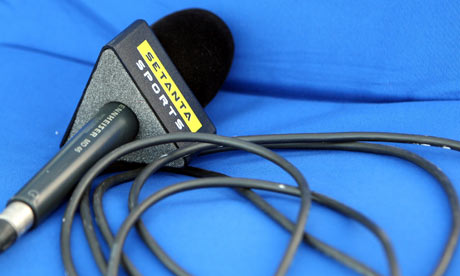
Sports organisations are poised to call in the lawyers to pick over their contracts with Setanta as it stands on the brink of collapse.
While the enhanced competition brought about by the Irish broadcaster's entry into the British pay-TV market has fuelled record deals for sports including football, boxing, golf and rugby union, it has now become clear that Setanta is unlikely to be able to honour its commitments. "It looks like there is no more in the cupboard," one source familiar with its predicament said last night.
Now, having planned their budgets on the basis of the revenues arising from Setanta's pledges, sports organisations and clubs will be forced into an uncomfortable recalibration of their expenditure. Some, including the FA with its £175m four-year deal and the Premier League (whose contract with Setanta is worth £130m for the broadcast of 46 matches a year) benefit from shareholder guarantees ensuring they will be paid even if the company fails.
It was the absence of those guarantees that caused such financial pain to Football League clubs with the collapse of ITV Digital in 2002. Several clubs were forced into insolvency after planning their budgets on forward revenues, indeed often borrowing against them.
Yet despite that experience several sports bodies who sold to Setanta are believed not to have such watertight arrangements with the broadcaster's shareholders, the venture capitalists Balderton Capital and Doughty Hanson and the investment bank Goldman Sachs.
Setanta's failure would have far-reaching consequences. The Guinness Premiership rugby clubs were set to benefit from a £54m three-year deal from the 2010-11 season, with the Scottish Premier League's contract worth £125m running until 2014. It is arguably those deals, both signed last year, that have apparently tipped the company over the edge, since they reduced the available cash to spend on what has always been its core offering: Premier League football. League negotiators, who must sell their rights to the highest bidder under the agreement with the European Commission competitions authority, are said to have reacted with disbelief when they opened Setanta's tender.
With Deloitte expected to be appointed administrator before the month is out, sports bodies now have two hopes. The first relies on the largesse of Sky, since sports would be returning to a monopoly market with their content. Insiders at the Murdoch broadcaster point to their £70m bid for Football League rights after the ITV Digital collapse, a sum that looked positively philanthropic at the time.
Sport's better hope is that a white-knight buyer takes on the company in short order with an offer to guarantee its losses, currently estimated to be £100m a year. Paradoxically, after balking at the £1bn it was quoted when previously inquiring about a takeover of Setanta, the Disney subsidiary ESPN might consider even that a good deal.

